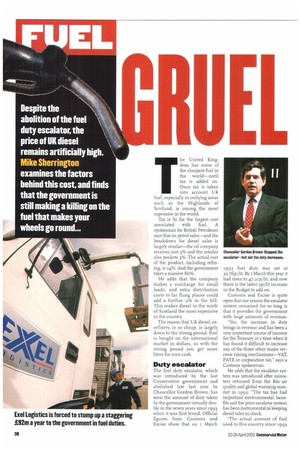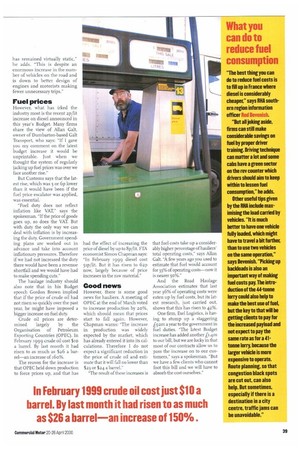T he United Kingdom has some of the cheapest fuel in
Page 40

Page 41

If you've noticed an error in this article please click here to report it so we can fix it.
the world—until tax is added on. Once tax is taken into account UK fuel, especially in outlying areas such as the Highlands of Scotland, is among the most expensive in the world.
Tax is by far the largest cost associated with fuel. A spokesman for British Petroleum says that on petrol sales—and the breakdown for diesel sales is largely similar—the oil company receives just 3% and the retailer also pockets 3%. The actual cost of the product, including refining, is 14%. And the government takes a massive 8o%.
He adds that the company makes a surcharge for small loads, and extra distribution costs to far flung places could add a further 2% to the bill. This makes diesel in the north of Scotland the most expensive in the country.
The reason that UK diesel, exrefinery, is so cheap, is largely down to the strong pound. Fuel is bought on the international market in dollars, so with the strong pound you get more litres for your cash.
Duty escalator
The fuel duty escalator, which was introduced by the last Conservative government and abolished late last year by Chancellor Gordon Brown, has seen the amount of duty taken by the government virtually double in the seven years since 1993 when it was first levied. Official figures from Customs and Excise show that on I March 19 93 fuel duty was set at 25.76p/lit, By I March this year it had risen to 47.21p/lit, and now there is the latest 2p/lit increase in the Budget to add on.
Customs and Excise is quite open that one reason the escalator system remained for so long is that it provides the government with large amounts of revenue.
"Yes, the increase in duty brings in revenue and has been a very important source of income for the Treasury at a time when it has found it difficult to increase any of the three other major revenue raising mechanisms—VAT, PAYE or corporation tax," says a Customs spokesman.
He adds that the escalator system was introduced after ministers returned from the Rio air quality and global warming summit in 1992: "The tax has had important environmental benefits and the price escalator system has been instrumental in keeping diesel sales in check.
"The actual amount of fuel used in this country since 19 93
has remained virtually static," ,t he adds. This is despite an enormous increase in the number of vehicles on the road and is down to better design of engines and motorists making fewer unnecessary trips."
Fuel prices
However, what has irked the industry most is the recent 2p/lit increase on diesel announced in this year's Budget. Many firms share the view of Allan Galt, owner of Dumbarton-based Galt Transport, who says: "If I gave you my comment on the latest budget increase it would be unprintable. Just when we thought the system of regularly jacking up fuel prices was over we face another rise."
But Customs says that the latest rise, which was 5 or Gp lower than it would have been if the fuel price escalator was applied, was essential.
"Fuel duty does not reflect inflation like VAT," says the spokesman. "If the price of goods goes up, so does the VAT. But with duty the only way we can deal with inflation is by increasing the duty. Government spending plans are worked out in advance and take into account inflationary pressures. Therefore if we had not increased the duty there would have been a revenue shortfall and we would have had to make spending cuts."
The haulage industry should also note that in his Budget speech Gordon Brown implied that if the price of crude oil had not risen so quickly over the past year, he might have imposed a bigger increase on fuel duty.
Crude oil prices are determined largely by the Organisation of Petroleum Exporting Countries (OPEC). In February 5999 crude oil cost $ro a barrel. By last month it had risen to as much as $26 a barrel—an increase of 16o%.
The reason for the increase is that OPEC held down production to force prices up, and that has
had the effect of increasing the price of diesel by up to 8p/lit. ETA economist Simon Chapman says: "In February 1999 diesel cost 51p/lit. But it has risen to 62p now, largely because of price increases in the raw material."
Good news
However, there is some good news for hauliers. A meeting of OPEC at the end of March voted to increase production by zo%, which should mean that prices start to fall again. However, Chapman warns: "The increase in production was widely expected by the market, which has already entered it into its calculations. Therefore I do not expect a significant reduction in the price of crude oil and estimate that it will fall no lower than $23 Or $24 a barrel."
"The result of these increases is that fuel costs take up a considerably higher percentage of hauliers total operating costs," says Allan Galt. "A few years ago you used to estimate that fuel would account for 33% of operating costs—now it is nearer 50%."
And the Road Haulage Association estimates that last year 36% of operating costs were eaten up by fuel costs, but its latest research, just carried out, shows that this has risen to 42%.
One firm, Exel Logistics, is having to stump up a staggering f92m a year to the government in fuel duties. "The latest Budget increase has added another fr.4m to our bill, but we are lucky in that most of our contracts allow us to pass the increase on to our customers," says a spokesman. "But we have a few clients who cannot foot this bill and we will have to absorb the cost ourselves."








































































































